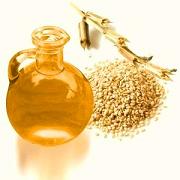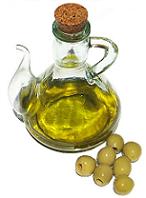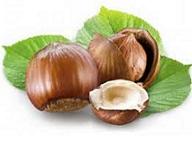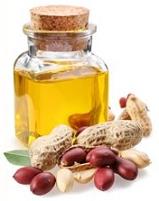Useful oils:
SESAME OIL.

Healthy oils: sesame oil. I already wrote about this oil in an article on sesame seeds and the beneficial properties of sesame seeds, including some little-known interesting facts.
Sesame oil is obtained from raw or roasted sesame seeds by cold pressing. The unrefined oil, produced from roasted sesame seeds, is dark brown in color, rich in sweet-nutty flavor and strong aroma. The oil obtained from raw sesame seeds is equally useful - it is light yellow in color and has a less pronounced taste and smell.
It should be borne in mind that unrefined sesame oil is not suitable for frying, and it is recommended to add it to hot dishes only before serving, preferably to a cooled dish. When heated, most of the nutrients that make up this oil are destroyed.
Strictly speaking, sesame oil cannot be unequivocally classified as a monounsaturated fat, since it contains almost equal proportions of both monounsaturated fats (Omega-9) and polyunsaturated fats (Omega-6).
Useful properties of sesame oil:1. Sesame oil is optimally balanced in terms of the content of polyunsaturated fatty acids, essential amino acids, vitamins (E, A, D, B1, B2, B3, C), minerals (potassium, calcium, phosphorus, zinc, magnesium, manganese, silicon) necessary for the human body , iron, copper, nickel, etc.), and other valuable biological active substances. For example, just 1 teaspoon of sesame oil contains your daily intake of calcium.
2. Sesame oil contains almost equal amounts of 2 healthy fatty acids Omega-6 (polyunsaturated linoleic acid) and Omega-9 (monounsaturated oleic acid).This complex of fatty acids helps to normalize fat metabolism and blood sugar levels, improve the functioning of the cardiovascular, reproductive, endocrine and nervous systems, strengthen immunity, and reduce the risk of developing cancer.
3. Sesame oil has the ability to neutralize the negative effects on the body of various toxins, carcinogens, radionuclides and heavy metal salts.
4. Sesame oil contains phytosterols, which strengthen the immune system, improve the condition of the skin, as well as the functions of the endocrine and reproductive systems.
5. Sesame oil contains phospholipids necessary for the functioning of the liver, brain, cardiovascular system and nervous system. They also improve the absorption of vitamins A and E.
6. Sesame oil contains the antioxidant squalene, which is needed for the full synthesis of sex hormones. It also helps to reduce the level of "bad" cholesterol in the blood, strengthens the immune system, and also has bactericidal and antifungal properties.
7. Sesame oil is useful for the digestive system, since it neutralizes high acidity, has anti-inflammatory, bactericidal, laxative and anthelmintic effect, and also helps to eliminate ulcerative lesions of the gastrointestinal tract, thanks to its constituent vitamins A and E, squalene and phospholipids, healing wounds.
8. Sesame oil is useful for the nervous system and mental stress. It contains phospholipids, essential amino acids, zinc, phosphorus and B vitamins, which are essential for the proper functioning of the nervous system and the brain.
9. Sesame oil helps to neutralize the harmful effects of stress on health, due to the content of magnesium, B vitamins, polyunsaturated acids and the antioxidant sesamoline. This oil helps relieve insomnia, depression, irritability and fatigue.
10. Sesame oil contains substances that help normalize the hormonal balance - phytosterols, phospholipids, Omega-6 and Omega-9 acids, vitamin E, B vitamins, zinc.
11. Sesame oil has a beneficial effect on the male reproductive system. Thanks to a complex of nutrients, it improves erection, prostate function and the process of spermatogenesis. These substances are vitamins E and A, zinc, magnesium, squalene and phytosterols.
The complex of nutrients that make up sesame oil makes it
excellent cosmetic, both as part of masks and creams, and as an independent skin care product:
1. Sesame oil penetrates deeply into the skin, nourishing and moisturizing it (thanks to vitamin E). This oil contains zinc, which is essential for the skin.
2. Sesame oil stimulates collagen synthesis (for this amino acids, silicon and vitamin C are "responsible" for this. Outwardly, this effect of sesame oil is expressed in the fact that the skin becomes more elastic and elastic.
3. Sesame oil normalizes the water-lipid balance of the skin and restores the protective functions of the epidermis.
4. Sesame oil contains squalene, which stimulates oxygen metabolism and blood circulation.
5. Sesame oil has very gentle exfoliation properties, cleansing the skin of dead cells and dirt.
6. Sesame oil has anti-inflammatory and bactericidal properties, making it useful for acne, inflammation, redness and flaking.
7. Sesame oil effectively fights the aging process of the skin due to its high content of antioxidants.
8. Sesame oil neutralizes the harmful effects of sunlight, thanks to the antioxidant sesamol, which absorbs ultraviolet radiation.
Useful oils:
OLIVE OIL.
Olive oil is perhaps the most common and popular of the healthy oils.Olive oil can be bright yellow, dark gold or greenish in color, depending on the olive variety and the degree of ripeness. The flavor of this oil also depends on the olive variety, but should never be tasteless or rancid. Good olive oil has a light spice flavor and a slightly tart odor.
Useful properties of olive oil:1. Olive oil contains almost all vitamins and minerals necessary for a person, which are well absorbed by the body.
2. Olive oil is especially useful for lowering cholesterol levels, as the content of linoleic acid (which helps to remove cholesterol from the body) is several times higher than in other vegetable oils. Therefore, olive oil is a good remedy for the prevention of cardiovascular diseases.
3. Olive oil helps to normalize blood pressure. However, to get rid of any blood pressure problems, eating healthy oils alone is not enough. But you can get rid of them, and it's not so difficult to do it - read the article Pressure Treatment.
4. Olive oil promotes rejuvenation of the body, thanks to the content of vitamin E and antioxidants. Moreover, this beneficial property of olive oil is manifested both when used for food and when applied externally. Olive oil smoothes fine lines and prevents the appearance of new ones.
5. Olive oil helps to strengthen the immune system.
6. Olive oil is useful for the prevention of atherosclerosis. This beneficial property of olive oil is provided by the biologically active carbohydrates, sterols, terpene disperse and tocopherol contained in it.
7. Olive oil has analgesic and anti-inflammatory properties due to the compounds of oleocanthal. it promotes healing of wounds, sores and cuts.
8. Olive oil is very beneficial for the digestive system, improving the activity of the stomach, intestines, pancreas and liver. With a mild laxative effect, olive oil is great for normalizing stools. Also, olive oil has a choleretic property, so it is recommended to use it for cholelithiasis or after removing the gallbladder.
9. Olive oil helps fight obesity due to its high content of oleic acid, which improves the absorption and processing of fats.
The benefits of olive oil when used topically are also known. It can be applied to the skin of the face and the whole body (both as a stand-alone cosmetic product and as a base with the addition of various essential oils), on hair and nails (to strengthen them).
Useful oils:
AVOCADO OIL.
Healthy oils: avocado oil. Avocado oil has gained popularity relatively recently. 80% of the fatty acids included in it are oleic acid (Omaga-9), which makes it possible to unambiguously classify this oil as a monounsaturated fat. Avocado oil is thick, greenish or dark green in color (due to the high amount of chlorophyll). When exposed to light, its color turns brown. It has a mild nutty aroma and a pleasant nutty flavor.
Avocado oil is not suitable for frying; it should only be added to ready-made meals.
Health benefits of avocado oil:1. Avocado oil contains a whole set of beneficial fatty acids (in descending order): oleic, palmitic, linoleic, palmitoleic, linolenic acids, stearic acids. These healthy fats regulate cholesterol and fat metabolism, participate in cell reproduction, remove toxins, heavy metals, radionuclides from the body and contribute to the normalization of blood circulation.
2. Avocado oil is extremely rich in vitamins and minerals that are perfectly absorbed by the body.Here is an incomplete list of vitamins and minerals contained in this super healthy oil: vitamins A, B1, B2, D, E (5 times more than olive oil), F, K, PP, potassium, calcium, phosphorus, zinc, magnesium , manganese, silicon, iron, sodium, copper, iodine, cobalt, barium, vanadium, molybdenum, boron, nickel, aluminum, titanium, silver, strontium, lead, tin.
3. Avocado oil has restorative and regenerating properties due to its high content of beneficial fatty acids.
4. Avocado oil also has antioxidant properties thanks to vitamins A and B.
5. Avocado oil helps to normalize blood pressure, improves vascular elasticity and reduces blood viscosity.
6. Avocado oil, like many other healthy vegetable oils, effectively lowers blood cholesterol levels. Thereby, helping to prevent and treat cardiovascular disease occurs.
7. Avocado oil helps in the treatment of gallstones and diseases of the digestive system (for example, gastric ulcer and duodenal ulcer, gastritis, pancreatitis and cholecystitis).
8. Avocado oil is good for joints. Its regular use is a good prevention of articular rheumatism and gout.
9. Avocado oil can help treat some forms of male and female infertility. Also, it has a beneficial effect on male potency.
10. Avocado oil is good for nursing mothers - it stimulates breast milk.
For skin and hair, avocado oil is simply irreplaceable:1. Avocado oil has a high biological activity due to the content of unsaponifiable fats.
2. Avocado oil effectively moisturizes and rejuvenates skin and hair. It is especially useful for problem skin (with dryness and flaking, neurodermatitis, dermatosis, eczema, psoriasis, seborrhea).
3. Avocado oil has bactericidal and wound-healing properties. It is used for burns, frostbite and ulcers.
Useful oils:
HAZELNUT OIL (HAZELNUT).
This vegetable oil is obtained from hazelnut kernels, which contain over 50% fat. They do not fry in hazelnut oil, as in other nut oils, since heat treatment destroys the taste and useful qualities of almost all nut oils. These super-healthy oils are added to salads, ready-made dishes, and marinades. This oil can completely transform any familiar dish, thanks to its bright and strong taste. For example, you can make a simple mashed potato and add very little hazelnut oil to it.
When used as a salad dressing, this peanut butter is usually blended with other light and soft oils (such as walnut oil or peanut butter) because of its pungent and strong taste.
Hazelnut oil goes rancid quickly, so it's best to keep it in the refrigerator. It can be stored for a very long time without losing its useful properties.
Useful properties of hazelnut oil (hazelnut):1. Hazelnut oil contains very little saturated fat, so it is almost completely absorbed by the body. This amount of unsaturated fatty acids is not found in any other vegetable oil: there are 94% of them in it - mainly monounsaturated oleic acid (Omega-9), as well as linoleic (Omega-6) and linolenic (Omega-3). There are so few carbohydrates in this oil that it can be consumed without even those who are prone to overweight accumulation.
2. Hazelnut oil is an excellent means of preventing cardiovascular diseases. With regular use of this oil, the chances of "earning" heart and vascular diseases are reduced by more than half.
3. Hazelnut oil is distinguished by a particularly successful combination of calcium, phosphorus, zinc, magnesium, iron, cobalt, sodium, fluorine, sulfur, cobalt, iodine, chlorine and copper, as well as a complete set of essential amino acids.The high content of potassium, calcium in combination with sodium contributes to the effective development and strengthening of bone structure and reduce blood pressure.
4. Hazelnut oil differs from other nut oils in its increased concentration of vitamin E, which has a very beneficial effect on the thymus gland, on the normal functioning of which the immune system depends.
5. Hazelnut oil helps to cleanse from parasites.
6. Hazelnut oil has a beneficial effect on brain activity.
Concerning
cosmetic properties hazelnut oil (hazelnut), it is considered one of the best vegetable oils for the care of combination, oily, and problem skin:
1. Hazelnut oil is perfectly absorbed without leaving any marks on the skin. As with food, this oil is perfectly absorbed when applied to the skin.
2. Hazelnut oil has a tightening effect, which helps to reduce enlarged pores on the face.
3. Hazelnut oil has cleansing, anti-inflammatory and wound healing properties. They help eliminate acne and also heal abscesses and abscesses.
4. Hazelnut oil makes hair beautiful and strong when rubbed into the scalp.
Useful oils:
PEANUT BUTTER.

Peanut butter is derived from the fruit of the groundnut, also called peanuts. The most beneficial is unrefined cold-pressed peanut butter without any chemical treatment. It has a reddish brown hue and has a rich peanut flavor. Unrefined peanut oil is not recommended for frying, as it produces toxic compounds when heated.
In contrast, refined and deodorized peanut butter has a milder flavor and aroma and a lighter yellow hue. Losing some useful properties due to processing, it acquires greater resistance to high temperatures, therefore, it is more suitable for frying. At the same time, peanut oil is required 2-3 times less than refined sunflower oil. Still, peanut butter is not the healthiest for frying. Only coconut oil is ideal for high temperatures and retains its beneficial properties.
Often peanut butter is also called a paste made by grinding peanut fruit. Pasta differs in consistency and its composition from oil, but it is also a healthy and nutritious product, especially if you cook it yourself.
Useful properties of peanut butter:1. Peanut butter contains 50-60% monounsaturated oleic acid (Omega-9), 15-30% polyunsaturated linoleic acid (Omega-6), a small amount of alpha-linolenic acid (Omega-3) and about 20% of various saturated acids ( palmitic, stearic, arachidic, lignocerolic, etc.). Omega-6 and Omega-9 in a complex strengthen the immune system, contribute to the normalization of blood cholesterol levels (lower the level of "bad" cholesterol and increase the level of "good"), improve the functioning of the heart and blood vessels, have a beneficial effect on the functioning of the nervous system, promote hormonal balance.
2. Peanut butter contains a large amount of essential amino acids necessary for the human body, vitamins (A, E, D, B1, B2, B3, B4, B5, B8, B9) and minerals (calcium, phosphorus, zinc, magnesium , iron, potassium, copper, iodine, cobalt, etc.).
- Vitamins A and E in the complex have a beneficial effect on both the skin and vision, and also have immunostimulating, anti-inflammatory and wound-healing properties.
- a complex of B vitamins (B1, B2, B3, B4, B5, B8, B9), take an active part in carbohydrate, protein, water-salt, lipid metabolism, play an important role in the process of hematopoiesis, regulate the work of the nervous, cardiovascular , muscular and digestive systems, and also contribute to maintaining optimal hormonal balance in the human body. B vitamins are also necessary for healthy skin, nails and hair, for good vision and strong immunity.
- It should be noted that peanut butter is very rich in choline (vitamin B4), which is necessary for the human body for the synthesis of phospholipids (preventing fatty liver infiltration and the development of gallstone disease), proteins and the neurotransmitter acetylcholine, which ensures optimal and harmonious functioning of the nervous system.
- Fat-soluble vitamin D is necessary for the full growth and regeneration of bone tissue, strengthening the immune system, as well as for the prevention of some cancer, cardiovascular and endocrine diseases.
3. Peanut butter has a beneficial effect on the functioning of the nervous, cardiovascular and digestive and immune systems, due to the content of substances such as betaine, phytosterols, phospholipids, polyphenols, etc.
4. Peanut butter promotes optimal protein absorption and improves liver function, thanks to the betaine it contains.
Unrefined peanut butter contains lecithin, which significantly improves brain activity.
5. Peanut butter is distinguished by a high concentration of resveratrol polyphenol, which gives it many beneficial properties:
- the property to have antioxidant and antitumor effects,
- the property to prevent the development of diabetes mellitus,
- the property to improve the balance of estrogen in the female body,
- the property to reduce the content of cholesterol in the blood,
- the property to improve liver function,
- the property to stimulate the natural production of collagen,
- the property to help in the fight against excess weight.
7. Energizing, quickly creating a feeling of fullness, peanut butter is also quite often used in their diet by fashion models who want to lose excess weight, as well as people whose work activity is associated with great physical and mental stress. And, in addition, peanut oil, rich in vitamins E, A and D, necessary for the full development of a growing child's body, iodine, phosphorus, calcium and zinc, has recently been increasingly used in the diet of baby food.
8. Peanut oil helps to improve physical activity and muscle tone. It is also useful for heavy physical exertion.
9. Peanut butter helps to normalize sleep and restore strength.
10. Peanut butter has a beneficial effect on male sexual function and potency.








